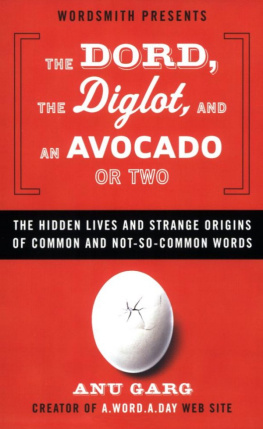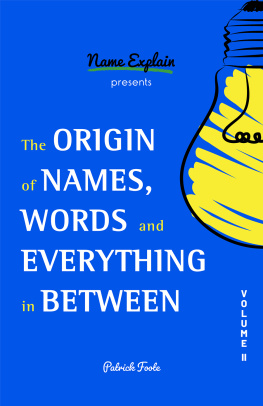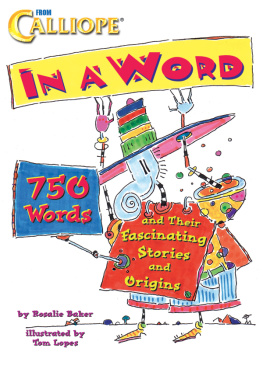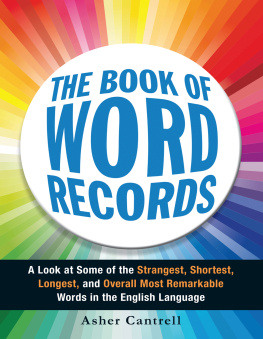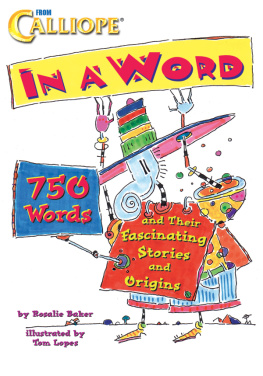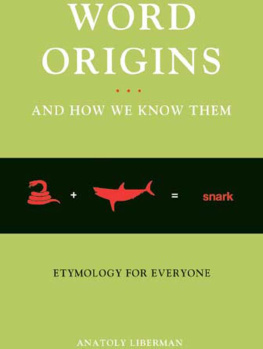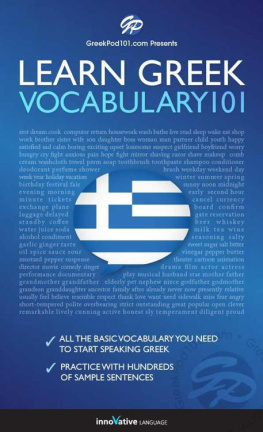Table of Contents
A PLUME BOOK
THE DORD, THE DIGLOT, AND AN AVOCADO OR TWO
ANU GARG is the founder of Wordsmith.org, a community of word lovers throughout the world, in two hundred countries. He is the author of two bestsellers on the joy of words. He lives in the Seattle area with his wife and daughter.
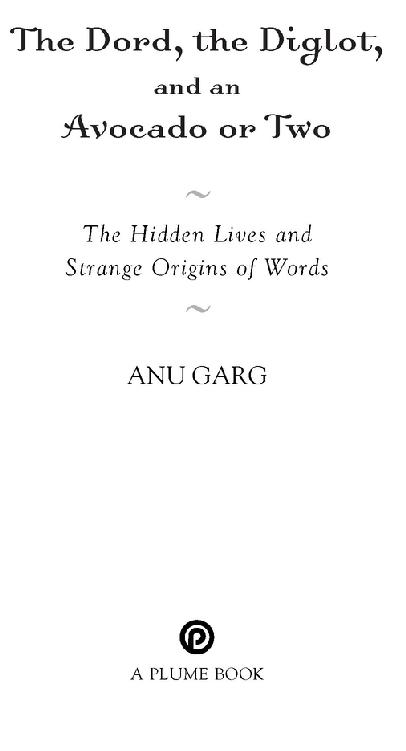
PLUME
Published by Penguin Group
Penguin Group (USA) Inc., 375 Hudson Street, New York, New York 10014,
U.S.A. Penguin Group (Canada), 90 Eglinton Avenue East, Suite 700,
Toronto, Ontario, Canada M4P 2Y3 (a division of Pearson Penguin Canada Inc.)
Penguin Books Ltd., 80 Strand, London WC2R 0RL, England Penguin Ireland,
25 St. Stephens Green, Dublin 2, Ireland (a division of Penguin Books
Ltd.) Penguin Group (Australia), 250 Camberwell Road, Camberwell, Victoria
3124, Australia (a division of Pearson Australia Group Pty. Ltd.) Penguin
Books India Pvt. Ltd., 11 Community Centre, Panchsheel Park, New Delhi - 110
017, India Penguin Group (NZ), 67 Apollo Drive, Rosedale, North Shore 0745,
Auckland, New Zealand (a division of Pearson New Zealand Ltd.) Penguin
Books (South Africa) (Pty.) Ltd., 24 Sturdee Avenue, Rosebank, Johannesburg
2196, South Africa
Penguin Books Ltd., Registered Offices: 80 Strand, London WC2R 0RL, England
First published by Plume, a member of Penguin Group (USA) Inc.
First Printing, November 2007
Copyright Anu Garg, 2007
All rights reserved
REGISTERED TRADEMARKMARCA REGISTRADA
LIBRARY OF CONGRESS CATALOGING-IN-PUBLICATION DATA
Garg, Anu.
The dord, the diglot, and an avocado or two : the hidden lives and strange origins of words / Anu Garg. p. cm.
eISBN : 978-0-452-28861-4
1. English languageEtymology. I. Title.
PE1574.G27 2007
422dc22
2007006583
. Kirch
Without limiting the rights under copyright reserved above, no part of this publication may be reproduced, stored in or introduced into a retrieval system, or transmitted, in any form, or by any means (electronic, mechanical, photocopying, recording, or otherwise), without the prior written permission of both the copyright owner and the above publisher of this book.
PUBLISHERS NOTE
The scanning, uploading, and distribution of this book via the Internet or via any other means without the permission of the publisher is illegal and punishable by law. Please purchase only authorized electronic editions, and do not participate in or encourage electronic piracy of copyrighted materials. Your support of the authors rights is appreciated.
BOOKS ARE AVAILABLE AT QUANTITY DISCOUNTS WHEN USED TO PROMOTE PRODUCTS OR SERVICES. FOR INFORMATION PLEASE WRITE TO PREMIUM MARKETING DIVISION, PENGUIN GROUP (USA) INC., 375 HUDSON STREET, NEW YORK, NEW YORK 10014.
http://us.penguingroup.com
Compared to the drama of words, Hamlet is a light farce.
Anatoly Liberman
Introduction
What are words? The raw material for poetry, novels, plays, stories, and epics. But words are stories in themselveseach word has a story.
If you were looking for a book with the largest collection of stories in the worldall true storiesyou wouldnt have to look far. You probably already have that book: a dictionary. No wonder the French novelist Anatole France called a dictionary the universe in alphabetical order. This book is a collection of some of the more interesting stories behind words.
Each word has a biography. It tells us about its parents, where it was born, which corners of the world it traveled, and what twists and turns it took to reach where it is today. That biography of a wordthe story behind itis called etymology (from Greek etymos: true).
The parentage of some words remains obscure, waiting for a few intrepid detectives to trace, unearth, dig out, and explain. That doesnt stop speculators, though. For example, there are dozens of stories, each appearing to be the real one, for the origin of the term eighty-six (to discard, to refuse, or to be out of something).
Can you see a tooth in a dandelion? Thats how we got the word dandelion. It came to English from the French language. In French, dent-de-lion means tooth of a lionbecause its leaves look like the sharp teeth of a fearsome lion.
Even the words for the most mundane things have unusual stories. What do a bicycle and a biscuit have in common? Both begin with the letters b-i. Bi means two. So a bicycle has two wheels. And a biscuit is twice baked (or, at least, they used to be).
The little tags at the ends of shoelaces are called aglets. Thats because in French, aiguille means needle and aiguillette is a little needle. So an aglet makes a shoelace work like a needle that we can thread through the holes in our shoes. Those holes are called eyelets, or little eyes.
A chad is the little circle thats cut out when you punch a hole in a sheet of paper. Why is it called a chad? Nobody knows. Sometimes the origin of a word is a mystery yet to be solved.
This book is a collection of stories behind words. It is not meant to be a comprehensive treatise on the origins of words; rather, it presents a selection of some of the most fascinating stories behind words.
Chapter 1
Hidden Lives of Everyday ords
We often believe movie actors have fascinating lives. We crave to know about the childhoods of rock stars. Popular magazines dish out scoops on celebrities, because, after all, who wants to know about the life of the everyman on the street?
Yet if we get to know even the most ordinary-looking persons on the street, well learn that they have fascinating stories to tell. Each mans and womans life could be an opera, if only we took the time to discover more about themwhere they were born, what they did while growing up, what makes them tick, what their dreams and wishes are, and more.
The same goes with words. Sure, celebrity words have charming stories to tell (the word googol, coined by a nine-year-old boy, became the inspiration behind the naming of the Google search engine), but rank-and-file words in a dictionary have had lives that are intriguing, too. Their origins involve lovely stories as well. Here are a few of them.
PUPIL
The two senses of this worda student and the part in the center of the eyeare related. We got this word from the Latin pupus meaning a boy and pupa meaning a girl. Remember the pupa of a butterfly? Its the same word.
Now what about the part in the center of the eye through which light enters? Have you seen your reflection in someones eyes? How tiny it appears! Even adults appear small like little children in other peoples eyes. And thats why that part of the eye is called a pupil.
DIPLOMA
A diploma is a paper we get from a school when we complete a course. But why is that paper called a diploma? Its because traditionally that paper was folded in two, and the Greek word diplo means double or in pairs; these days doctors and dentists proudly display their diplomas not folded but framed on their waiting room walls.
The word diplomat is related. Long ago, diplomatic meant relating to documents. The shift in the sense occurred from the titles of collections of documents that were related to international relations. So diplomatic corps shifted in meaning from a body of documents to a diplomatic cadre in a nations capital.

